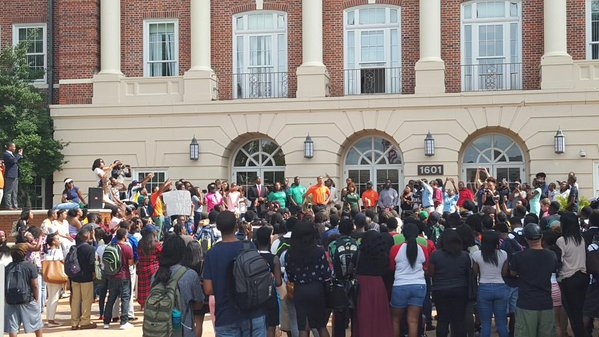You have /5 articles left.
Sign up for a free account or log in.

Students rally in support of Florida A&M's president.
Victor Gaines / Twitter
Florida A&M University’s chief narrowly avoided being fired during an emergency board meeting early Thursday morning. Yet while the board fell one vote short of securing the president’s ouster, nearly all members said they agreed on one thing: the relationship between the board and the president is dysfunctional.
Relations between the Board of Trustees and university president Elmira Mangum have been strained for much of her 18-month tenure at the public historically black college. While board members are clearly unhappy with Mangum, many students say she is doing a good job and organized a rally on her behalf Thursday afternoon. And some outside experts who have been watching events say that the board is micromanaging and belittling an accomplished administrator.
Earlier this week the board voted against awarding Mangum a performance bonus, saying she fell short in areas like board relations. Then on Thursday morning board members accused Mangum of improperly spending nearly $400,000 on renovations to the president’s home, and using funds improperly to give a cabinet member a bonus. Board members have also criticized her for not communicating with the board and promoting a hostile work environment at the university.

Yet Mangum has vehemently denied the accusations levied against her, saying that work on the president’s home was approved months before she took office. She said a $15,000 bonus given to the provost was accidently paid for with the wrong funds, but the mistake was promptly corrected once it was discovered, and noted how all other bonuses were paid with foundation funds (Florida law prohibits appropriations from being used to pay bonuses).
And she asserts that she is communicative with the board -- which she considers overbearing in their “micromanagement, surveillance and control,” according to a letter from Mangum to the board -- participating in required three-hour meetings with the chair each week, as well as voluntarily providing weekly notes to trustees.
Some on the board in the last year have been critical of Mangum’s travel and hiring decisions. And shortly after Mangum took the presidency, she fought a proposal to split the engineering school shared by FAMU and Florida State University. Mangum and others have successfully kept the system from splitting the school, but some board members have accused her of not fighting hard enough and are unhappy with a provision that FSU will take over financial management of the engineering school.
“If we don't take action today, then what we’re all saying is that we have to live with this less than stellar performance,” said Vice Chairman Kelvin Lawson Thursday morning, urging his fellow board members to fire Mangum. Lawson is the author of the original measure that called for Mangum’s firing, with cause. The motion failed 7 to 5, and a subsequent motion to fire her without cause failed 6 to 6.
Meanwhile, the board -- while requiring more communication from Mangum than it did of her predecessors -- has also made some aspects of the university, like the general counsel, report directly to board members, instead of the president.
During Thursday’s meeting, Mangum called accusations that she improperly spent university money “defamatory,” accused board members of “mudslinging” and micromanaging her and called the vote for her ouster a “mockery” and “a witch hunt for something that was wrong that I had nothing to do with.”
She says the Board of Trustees authorized improvements to the president’s residence before she took office, though the board does not seem to have record of this. She said she did not ask for or encourage the renovations. Purchase orders for the renovations were dated February 2014, before she took office, and June 2014, after she took office. Mangum says the second order, for a garage, was already in motion before she took office.
“It speaks to the lack of controls and lack of procedures that the institution has been plagued with for many years,” she said of the dispute. “To lay that at my doorstep … is a little bit unprofessional.”
She continued: “In my entire 30 years of service in regards to budget planning I have never been accused of breaching my responsibilities … until I came to Florida A&M, and it is insulting.” Mangum was previously a senior finance administrator at Cornell University and the University of North Carolina at Chapel Hill.
Yet several board members Thursday were unconvinced that Mangum was blameless when it came to spending on the president’s house, and also in allocating the wrong funds for the provost’s bonus. The board voted 9 to 0, with three members absent for the vote, to authorize an external investigation of the spending concerns.
Trustee Kimberly Moore said “the language and the tone” of Mangum’s self-defense “further divides and separates” the university, and noted that there are repeated accusations that, due to Mangum’s leadership, FAMU “is a hostile work environment and that there are communication issues.”
Added another trustee, Spurgeon McWilliams: “We need a change of leadership. I just don't think this is going to get better.”
Yet during and after the emergency board meeting, which was broadcast live on a public radio station, many alumni and staff came to Mangum’s defense, with dozens of students holding a rally and march Thursday afternoon in support of the president. And this summer five of the six FAMU alumni serving in the state Legislature asked the Board of Governors, which governs the entire state system, to investigate the Board of Trustees, largely because of its treatment of Mangum. Some of Mangum's defenders say that she is in fact making people uncomfortable on campus -- by asking tough questions about spending, management and educational issues.
Several board members on Thursday stressed how infighting between the board and the president is bad for the university’s reputation. The university is still recovering from the 2011 death of a marching band member due to hazing and subsequent allegations that the hazing was sanctioned by members of the FAMU staff. “The headlines, the conversation, the chatter have not been helpful to the university,” said one trustee, Torey L. Alston.
Some trustees, while critical of Mangum, said the board is not blameless and is also responsible for creating problems at the university. “There have been problems and issues between the board and the administration,” said one trustee, Belinda Shannon. “However I'm not willing to place the blame of that solely at the feet of the president.”
Marybeth Gasman, director of the University of Pennsylvania’s Center for Minority-Serving Institutions, believes the tension at FAMU is largely the result of an overzealous and overreaching board.
“She is being micromanaged on a daily basis and that is not the role of the board,” Gasman said, adding that the level of communication required by the board is much more than governing boards usually require. She also said that certain board criticisms, like those of Mangum’s travel, lack a nuanced understanding of higher education, as travel is tightly integrated in a president's role to raise money and strengthen an institution's national and global profile.
“These are ridiculous things that are hurting FAMU,” she said of the board’s criticisms, adding that Mangum may be facing extra scrutiny because of her gender. “The way that she has been harassed, I think they are looking for things that they could point to that could hurt her.”
Neither the board chair nor the vice chair, both of whom proposed or supported measures to fire Mangum, responded to requests for comment for this article. Mangum also did not respond to requests for an interview but did release a statement to the media saying she is “committed to working with all of our stakeholders to enhance the educational experience of our students, and ensure that this university operates at the most effective and efficient level possible.”
Given existing fissures between Mangum and the board, some question how the institution can move forward, and whether Mangum desires to keep her post, given board hostility toward her leadership.
“It's very difficult for a president to be successful where a large number of trustees don't want to work with her,” said Ray Cotton, a Washington-based lawyer who negotiates contracts on behalf of university presidents and governing boards. Cotton represented Mangum in her original employment negotiations with the FAMU board.
Felecia Commodore, an independent consultant and scholar who studies the governing boards of historically black colleges and universities, agrees with Gasman that the FAMU board is micromanaging the president, and says there “has to be external pressure” for the board to reevaluate its actions.
“Outside of that, something is going to have to give,” she said. “It’s either going to be a different president or a different board.”








